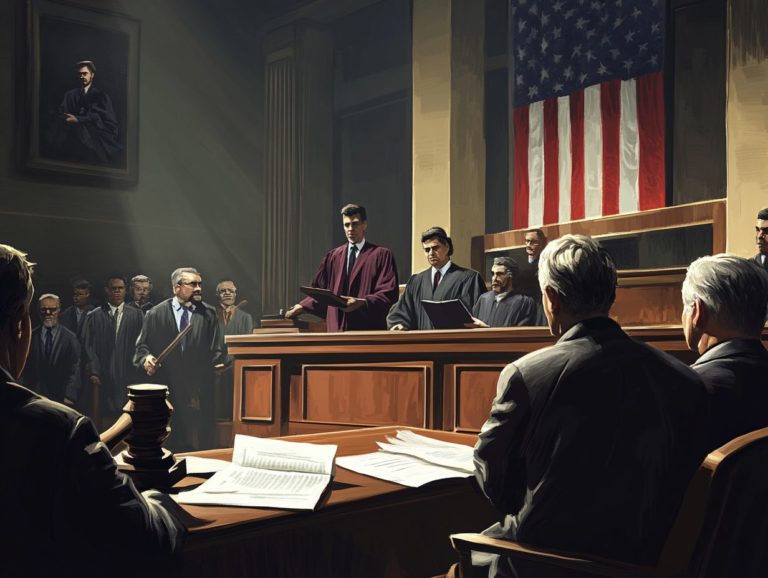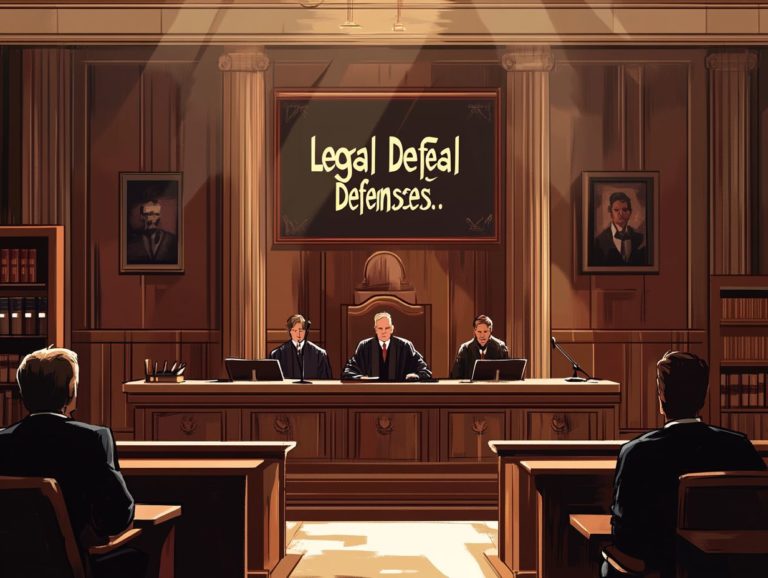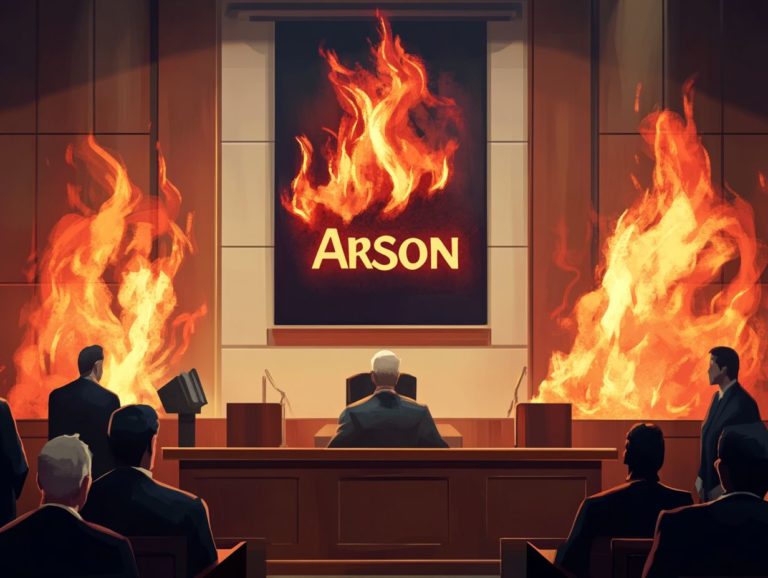Legal Rights in Cases of Human Trafficking
Human trafficking is a pressing global issue that affects millions. This crime knows no borders.
This overview defines human trafficking and describes its various forms. It explains the legal frameworks that combat this heinous crime and highlights the rights available to victims.
Discover the legal remedies victims can pursue and the challenges they face in seeking justice. Ongoing advocacy efforts aim to strengthen protections against trafficking.
Understanding this critical issue is essential for fostering a fairer society.
Contents
- Key Takeaways:
- Understanding Human Trafficking
- Legal Framework for Human Trafficking
- Rights of Trafficking Victims
- Legal Remedies for Trafficking Victims
- Challenges in Enforcing Legal Rights
- Advocating for Stronger Legal Protections
- Frequently Asked Questions
- What are legal rights in cases of human trafficking?
- What are the international legal frameworks that protect the rights of trafficking survivors?
- What are some of the key legal rights that are granted to trafficking survivors?
- Are trafficking survivors entitled to compensation?
- What legal remedies are available to trafficking survivors?
- What can be done to ensure the protection of legal rights in cases of human trafficking?
Key Takeaways:
- Human trafficking is a serious crime involving exploitation for profit or forced labor.
- Victims have legal rights to protection and compensation under various laws.
- Despite these protections, enforcing victims’ rights remains a challenge, making strong advocacy crucial.
Understanding Human Trafficking
Grasping human trafficking is vital to tackling this complex issue. It impacts millions, especially vulnerable populations like children.
This crime takes many forms, including sex trafficking and labor trafficking. Each form presents unique challenges requiring targeted prevention and support.
The U.S. government has made progress through laws like the Trafficking Victims Protection Act. However, ongoing awareness is critical for developing effective strategies.
Defining Human Trafficking and Its Forms
Human trafficking is the illegal trade of people for exploitation. It includes sex trafficking and labor trafficking, both of which involve coercion and manipulation.
In sex trafficking, victims face forced prostitution or sexual acts. This often targets vulnerable groups, such as minors.
Labor trafficking subjects individuals to terrible working conditions. Victims often lose their freedom and are threatened with violence.
The trauma from trafficking leaves deep psychological scars. These effects can last a lifetime.
Legal definitions show that trafficking isn’t just about physical exploitation. It also involves stripping away personal freedom. This reality highlights the need for preventive measures and strong support systems.
Legal Framework for Human Trafficking
The U.S. legal framework against human trafficking consists of federal laws designed to combat these crimes and support victims.
At the center is the Trafficking Victims Protection Act. This landmark law helps prosecute offenders and outlines victims’ rights.
The Department of Justice plays a vital role in enforcing these laws. It ensures victims receive the legal support they need.
International and National Laws and Conventions
International laws are crucial in addressing human trafficking. The Trafficking Victims Protection Act is a key legal tool in the U.S.
This Act operates within a broader international framework. Various conventions aim to combat this serious violation of human rights.
The United Nations Convention against Transnational Organized Crime provides guidelines for countries to strengthen their legal frameworks.
By aligning domestic laws with international standards, the U.S. can enhance victim support and hold traffickers accountable.
Rights of Trafficking Victims
The rights of trafficking victims are paramount in ensuring their protection, assistance, and compensation, as recognized by various legal frameworks and advocacy efforts.
These rights encompass access to legal aid, support services, and avenues for compensation. They reflect a commitment to restoring dignity and agency to those affected by trafficking crimes.
Effective protection measures are essential to safeguard their well-being and aid in their recovery process.
Protection, Assistance, and Compensation
Protection measures for trafficking victims require a multi-faceted approach that includes legal aid and compensation. This ensures their recovery and successful reintegration into society.
This comprehensive strategy encompasses various forms of assistance, such as immediate shelter and emotional support. Both are essential as victims navigate the complex aftermath of their experiences.
Specialized legal aid services are available to help you understand your rights and pursue justice against your traffickers. Compensation mechanisms are also crucial, enabling you to receive financial support for medical expenses, lost wages, and other costs incurred as a result of exploitation.
By prioritizing these protective measures, communities can cultivate an environment where trafficking survivors feel safe and enabled to rebuild their lives.
Legal Remedies for Trafficking Victims
Legal remedies for trafficking victims offer various pathways to seek justice. They address the complexities of trafficking crimes and their profound impacts on victims’ lives.
These remedies are crucial, not just for holding perpetrators accountable, but also for enabling victims to reclaim their rights and seek restitution for their suffering.
This framework includes options for pursuing criminal charges against traffickers, as well as civil claims for damages. This ensures that you have the tools needed to navigate the legal landscape effectively.
Criminal and Civil Legal Actions
Trafficking victims have the right to pursue both criminal and civil legal actions as they seek justice and accountability from their traffickers. Navigating these legal avenues may seem daunting, but understanding the distinctions between them is essential for anyone seeking redress.
Criminal actions, typically initiated by the state, focus on punishing the traffickers and can result in incarceration. In contrast, civil actions enable victims to file lawsuits against their traffickers, aiming for monetary compensation for the harm they’ve endured.
In the criminal realm, the burden of proof rests with the prosecutor, who must establish guilt beyond a reasonable doubt. On the other hand, civil cases operate under a lower standard; people who bring a case to court often need only to show that their claims are more likely true than not.
Each pathway offers distinct potential outcomes that can influence both legal results and the healing journey for victims.
Challenges in Enforcing Legal Rights
Challenges in enforcing legal rights for trafficking victims frequently arise from systemic barriers that impede their access to justice, support, and recovery.
These obstacles may encompass a lack of awareness regarding legal rights, inadequate legal representation, and the pervasive social stigma associated with trafficking. It is crucial to address and overcome these challenges to enable victims to pursue justice and reclaim their lives.
Barriers to Seeking Justice and Support
Barriers to seeking justice and support for trafficking victims often manifest as a tangled web of fear, access issues, and societal stigma. These challenges often overlap, creating a tough environment for those who need help.
The fear of retribution can be paralyzing, stemming from threats made by traffickers. Many individuals may lack the legal knowledge or connections necessary to navigate the complex judicial process, complicating their ability to seek justice.
Additionally, societal stigma rooted in pervasive misconceptions about trafficking can discourage victims from reaching out for support. This leads to feelings of isolation and shame. When these factors come together, they can significantly impede the ability to reclaim autonomy and access essential services for recovery.
Advocating for Stronger Legal Protections
Advocating for stronger legal protections is essential in the fight against human trafficking.
Your efforts can lead to meaningful policy changes that enhance support for victims and bolster prevention initiatives.
By engaging in advocacy at both local and national levels, you can gather support, raise awareness, and drive legal reforms.
Ultimately, this will establish a more effective prosecution framework against trafficking crimes.
Involving communities and stakeholders in this vital work is crucial for fostering a comprehensive response to this pressing issue.
Efforts to Strengthen Laws and Policies
Efforts to strengthen laws and policies surrounding human trafficking are gaining significant momentum.
This reflects a heightened awareness of the urgent need for robust protections for victims.
Organizations like Polaris and the National Human Trafficking Hotline play a pivotal role in advocating for systemic reforms.
They push for comprehensive legislation that increases penalties for perpetrators and ensures that survivors receive essential support services.
Recent initiatives include state-level bills designed to boost funding for victim assistance programs and equip law enforcement with training that helps them understand and support victims of trauma.
Campaigns that raise public awareness about the signs of trafficking are critical in mobilizing community vigilance.
This collective endeavor aspires to create an environment where trafficking can be effectively identified and eradicated.
Frequently Asked Questions
Here are some common questions about legal rights in human trafficking cases.
What are legal rights in cases of human trafficking?
Legal rights in cases of human trafficking refer to the protections and entitlements granted to survivors under international and domestic laws.
These rights include access to justice, protection, and support services.
What are the international legal frameworks that protect the rights of trafficking survivors?
The international legal frameworks that protect the rights of trafficking survivors include:
- The United Nations Protocol to Prevent, Suppress and Punish Trafficking in Persons
- The United Nations Convention against Transnational Organized Crime
- The Universal Declaration of Human Rights
What are some of the key legal rights that are granted to trafficking survivors?
Some key legal rights that are granted to trafficking survivors include:
- The right to be free from slavery and forced labor
- The right to access justice and a fair trial
- The right to receive protection and support services
- The right to be treated with dignity and respect
Are trafficking survivors entitled to compensation?
Yes, trafficking survivors are entitled to compensation under international and domestic laws.
This includes compensation for physical, psychological, and material harm suffered as a result of trafficking.
What legal remedies are available to trafficking survivors?
Trafficking survivors have the right to seek legal remedies, such as:
- Filing a criminal complaint against their traffickers
- Initiating a civil lawsuit for damages
- Seeking protection orders
They can also access legal aid and other support services to assist with their case.
What can be done to ensure the protection of legal rights in cases of human trafficking?
To ensure the protection of legal rights in cases of human trafficking, it is essential to:
- Enforce laws strongly
- Provide training and resources to law enforcement and judicial officials
- Establish comprehensive support services for survivors
We must tackle the root causes of trafficking, like poverty and inequality, to make a real difference.
Get involved today to help combat human trafficking and support survivors.






